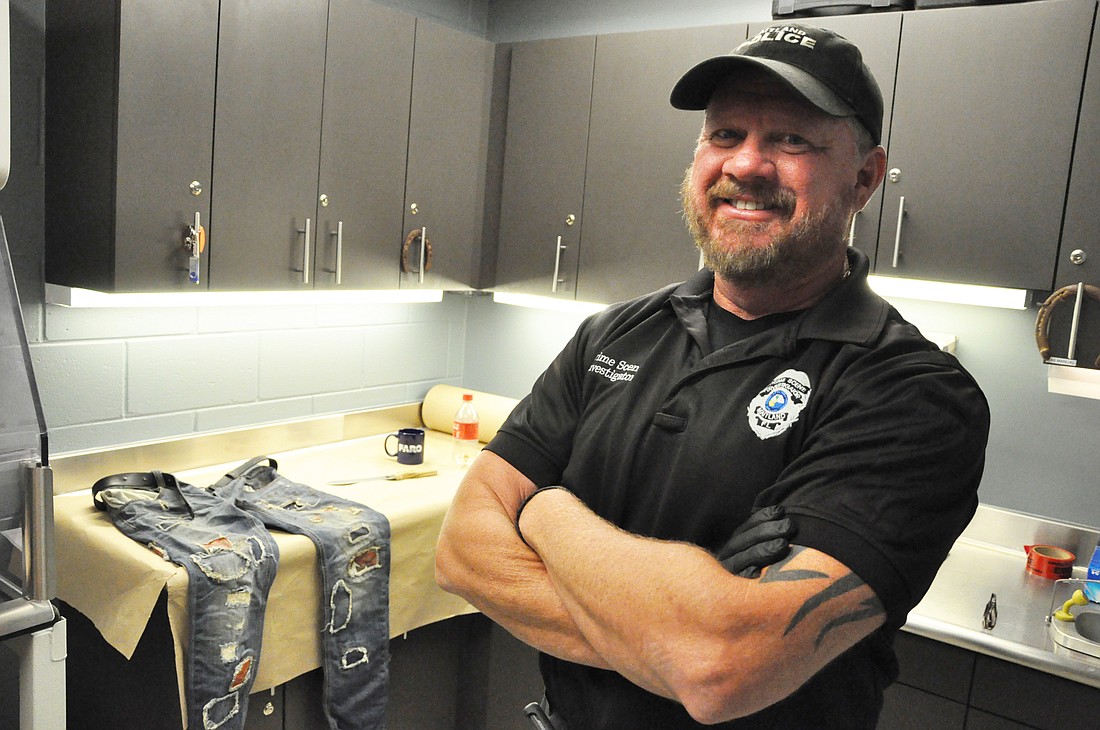- April 20, 2024
-
-
Loading

Loading

Brian Meyers has never seen an episode of “CSI: Crime Scene Investigation.”
And why would he? He sees the real thing every day.
Meyers has been the crime scene investigator for the Maitland Police Department for the last six years, helping to catch criminals by tracking down clues.
The Maitland CSI has responded to more than 250 cases — from suspicious deaths to shootings to extensive burglaries — in the city.
As soon as Meyers arrives on the crime scene, the wheels start turning.
“I try to put the pieces of the puzzle together while my detectives are talking to the people trying to get the story,” Meyers said. “Once we come together, they’re going to tell me the story, and I’m going to say, ‘Yay’ or, ‘Nay, that’s not what the evidence shows.’”
DON’T EVER ASSUME
One thing that Meyers has learned during his time as a CSI: things aren’t always what they seem. A potential theory of what transpired can get completely turned on its head by the end of an investigation, Meyers said.
“The first death I ever went on a lady shot herself behind the ear, she was laying (back), and the gun was (perfectly sitting on her chest),” Meyers said. “I’m like, ‘How does that do that?’ But after going through the academy and watching different scenarios, (the gun) can end up anywhere. That’s the stuff they teach you. … Don’t ever walk in and assume because of the way you see things that that’s your puzzle. You really have to put the pieces together and work it.”
To catch a criminal, Meyers often will put himself in the suspect’s shoes to decipher where to dust for fingerprints. If the suspect broke into a car, he or she might have touched the door handle or the gear shift. Meyers will even climb through a window himself to see where a burglar may have put his or her hands.
“I put myself at the crime scene or wherever this happened and just kind of replay it,” Meyers said. “It’s kind of built into you. Anybody can do the job, but are you doing the job right?”
Meyers also is in charge of cataloging evidence — from drugs and weapons to personal items.
“Because we’re a small agency and we don’t have a ton of crime, my day-to-day is evidence and property,” Meyers said. “My daily activities involve taking care of all the evidence and property, making sure the state attorney gets all the evidence and videos and whatever they ask for. When patrol comes upon a suspicious death … they’re going to call me out to alleviate any suspicion.”
SEEKING JUSTICE
Meyers joined the Maitland Police Department as a patrol officer 23 years ago before transitioning into community policing. In 2012, he was approached by the department with a unique opportunity: He was hand-picked to receive training at the National Forensics Academy at the University of Tennessee.
During the 10-week, 400-hour course, Meyers learned how to find clues using everything from the trajectory of bullets to finger prints to blood-spatter analysis.
“When blood drops straight down, it’s going to satellite like this, if somebody’s moving it’s going to hit, drop and elongate,” Meyers said. “You’ll be able to measure that blood and tell at what angle that blood fell off that person.
“When you look at the blood, you can tell if they’re going up stairs or if they’re coming down stairs,” he said. “It tells direction.”
It’s a job that’s suited Meyers well, he said. Even when he was a patrol officer, Meyers always arrived on the scene and asked questions to try to figure out what transpired.
“I’ve always been interested in it, but I didn’t know I was interested in it,” Meyers said. “I was always the guy at the crime scene trying to figure out what happened, what’s going on. I was the guy asking those questions.”
But Meyers isn’t only driven by curiosity; it’s also responsibility. Meyers often will walk away from even a small crime scene with hundreds of photos. Once you leave the crime scene, there’s no going back. No second chances, he said.
“I’m always looking for justice,” Meyers said. “When I show up at the scene, there’s victims out there, and they shouldn’t be victims. I want justice for those victims, whether they’re alive or dead.
“I want to know that somebody took my case if it was me, and worked it till they couldn’t work it anymore,” he said. “I’m that guy. I’m going to work your case, and I’m going to do it until I know that I can look you straight in the eye without a doubt and say, ‘I’ve done everything, and this is what I found, this is what I didn’t find.’ (Think about) the family members — I want to close that door for those people. I want to give them an answer.”